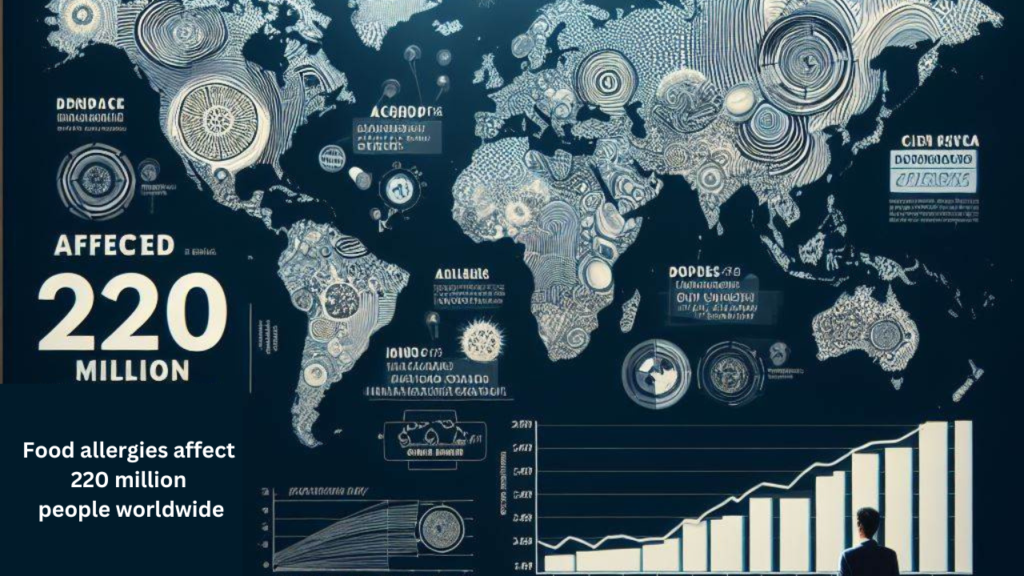🌐 The Future of Food Allergy Management: New Technologies and Treatments 🧬
Food allergies, triggered by specific allergens, can lead to severe reactions like anaphylaxis. However, innovative treatments are revolutionizing allergy management, offering hope for safer and more effective options. Let’s delve into the exciting developments shaping the future of food allergy care.
Introduction to Modern Food Allergy Management

- Global Impact: Food allergies affect 220 million people worldwide, with a robust upward trend observed. This number represents diagnosed cases, but the actual prevalence may be even higher.
- Common Culprits: Over 170 foods have been reported to cause allergic reactions, including staples like peanuts, milk, eggs, and seafood1.
- Immune System Sensitivity: These allergies arise from the IgE-mediated immune system’s sensitivity to prevalent food allergens. Sometimes, immune system imprinting goes awry, leading to pathogenic memory cells that react to otherwise harmless substances.
Advancements in Allergy Detection (Food Allergy Management)
- Diagnostic Tests: Routine tests include oral food challenges, skin-prick tests, and allergen-specific IgE detection. However, promising tests like the basophil activation test, mast cell activation test, and bead-based epitope assay are in development, focusing on specificity and multiplexing capabilities.
- Portable Solutions: Companies like Allergy Amulet have developed ultra-portable devices that allow users to test food for allergens on the go.
Immunotherapies and Biologics (Food Allergy Management)
- Palforzia: This oral immunotherapy product is at the forefront, offering new hope for mitigating allergic reactions. It gradually desensitizes patients to peanut allergens, reducing the risk of severe responses.
- Omalizumab: A biologic drug, it targets IgE antibodies and has shown promise in treating allergic asthma and chronic idiopathic urticaria.
Personalized Medicine and Cutting-Edge Biotechs
- Gene Therapy: Researchers are exploring gene-based approaches to modify immune responses and enhance tolerance to allergens.
- Monoclonal Antibodies: These engineered antibodies can specifically target allergic mediators, providing targeted relief.
Digital Health Solutions
- Personalized Care: Digital tools enable patients to track symptoms, allergen exposure, and treatment progress. Apps and wearables empower individuals to manage their allergies effectively.
- AI and ML: Artificial Intelligence (AI) and Machine Learning (ML) aid in understanding disease mechanisms, improving diagnostics, predicting treatment outcomes, and discovering new drugs.
Challenges and Considerations
- Race Against Time: Balancing safety and efficacy in new treatments is crucial. Rigorous clinical trials are essential.
- Ethical Dilemmas: The intersection of race, genetics, and personalized medicine requires careful navigation to avoid perpetuating biases.
- Global Collaboration: Collaborative efforts are necessary to ensure equitable access to cutting-edge treatments worldwide.
In summary, the future of food allergy management is promising. As science evolves, we move closer to a world where allergies no longer dictate our lives. Let’s embrace innovation, compassion, and scientific integrity as we navigate this exciting frontier! 🌱🌍🧬
More articles
https://news24.edupedia.site/2024/02/26/genome-study/
https://news24.edupedia.site/2023/06/04/ashtanga/
Tribandh pranayam demonstration
Meditation in the classroom is like icing on the cakeEdit
Discover more from News 24 Media
Subscribe to get the latest posts sent to your email.


